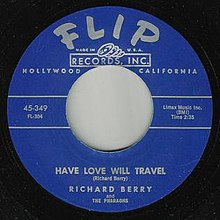
The Animals are an English rock band, formed in Newcastle upon Tyne in the early 1960s. The Animals are known for their deep-voiced frontman Eric Burdon and for their gritty, bluesy sound, exemplified by their signature song and transatlantic number-one hit single "The House of the Rising Sun" as well as by hits such as "We Gotta Get Out of This Place", "It's My Life", "Don't Bring Me Down", "I'm Crying", "See See Rider" and "Don't Let Me Be Misunderstood". They balanced tough, rock-edged pop singles against rhythm-and-blues-oriented album material and were part of the British Invasion of the US.
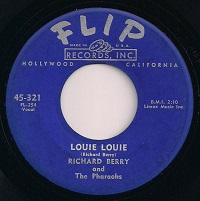
"Louie Louie" is a rhythm and blues song written and composed by American musician Richard Berry in 1955, recorded in 1956, and released in 1957. It is best known for the 1963 hit version by the Kingsmen and has become a standard in pop and rock. The song is based on the tune "El Loco Cha Cha" popularized by bandleader René Touzet and is an example of Afro-Cuban influence on American popular music.
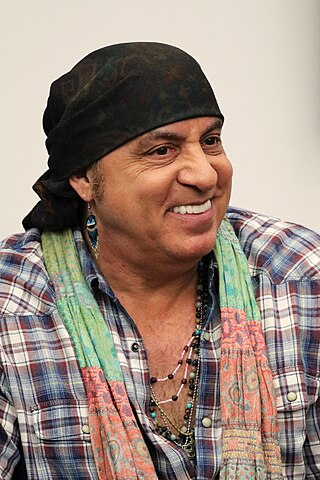
Steven Van Zandt, also known as Little Steven or Miami Steve, is an American musician and actor. He is a member of Bruce Springsteen's E Street Band, in which he plays guitar and mandolin. He has appeared in several television drama series, including as Silvio Dante in The Sopranos (1999–2007) and as Frank Tagliano in Lilyhammer (2012–2014). Van Zandt has his own solo band called Little Steven and the Disciples of Soul, intermittently active since the 1980s.

Richard Berry, Jr. was an American singer, songwriter and musician, who performed with many Los Angeles doo-wop and close harmony groups in the 1950s, including The Flairs and The Robins.

The Sonics are an American garage rock band from Tacoma, Washington, that formed in 1960. Their aggressive, hard-edged sound has been a major influence on punk and garage music worldwide, and they have been named inspirations to the White Stripes, LCD Soundsystem, Nirvana and other musical artists.
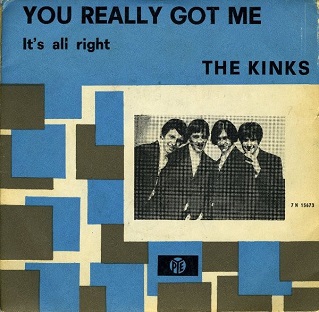
"You Really Got Me" is a song by English rock band the Kinks, written by frontman Ray Davies. The song, originally performed in a more blues-orientated style, was inspired by artists such as Lead Belly and Big Bill Broonzy. Two versions were recorded, with the second performance used for the final single. Lead guitarist Dave Davies performs the song’s famous guitar solo. Although it was long rumoured that future Led Zeppelin guitarist Jimmy Page had performed the song's guitar solo, this has been debunked by Page himself.

"Born to Run" is a song by the American singer-songwriter Bruce Springsteen and the title track of his third studio album, Born to Run (1975). It was Springsteen's first worldwide single release, although it achieved little initial success outside of the United States. Within the U.S., however, it received extensive airplay on progressive or album-oriented rock radio stations. The single was also Springsteen's first Top 40 hit on the Billboard Hot 100, peaking at #23.

"Good Golly, Miss Molly" is a rock 'n' roll song first recorded in 1956 by American musician Little Richard and released in January 1958 as Specialty single 624, and later on Little Richard in July 1958. The song, a jump blues, was written by John Marascalco and producer Robert "Bumps" Blackwell. Although it was first recorded by Little Richard, Blackwell produced another version by the Valiants, who imitated the fast first version recorded by Little Richard, not released at that time. Although the Valiants' version was released first, Little Richard had the hit, reaching No. 4. Like all his early hits, it quickly became a rock 'n' roll standard and has subsequently been recorded by hundreds of artists. The song is ranked No. 92 on the Rolling Stone magazine's list of the 500 Greatest Songs of All Time.
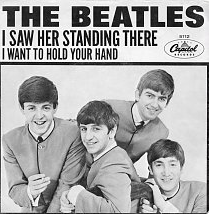
"I Saw Her Standing There" is a song by the English rock band the Beatles, written by Paul McCartney and John Lennon. It is the opening track on the band's 1963 debut UK album Please Please Me and their debut US album Introducing... The Beatles.
The Wailers, often known as The Fabulous Wailers, were an American rock band from Tacoma, Washington. They became popular in the Pacific Northwest from the late 1950s to the early 1960s, performing saxophone-driven R&B and Chuck Berry rock and roll. Their biggest hit was "Tall Cool One", first released in 1959, and they have been credited as being "one of the very first, if not the first, of the American garage bands."

"The Ghost of Tom Joad" is a folk rock song written by Bruce Springsteen. It is the title track to his eleventh studio album, released in 1995. The character Tom Joad, from John Steinbeck's classic 1939 novel The Grapes of Wrath, is mentioned in the title and narrative.

"The Moan" is a single by the American blues-rock duo The Black Keys, first released on 7" vinyl in 2002 (ALIVE0047-1), and on CD in 2004 (ALIVE0047-2). The CD is their last release for Alive Records, as the band switched to Fat Possum Records to publish their LP Thickfreakness the previous year.
"Around and Around" is a 1958 rock song written and first recorded by Chuck Berry. It originally appeared under the name "Around & Around" as the B-side to the single "Johnny B. Goode".
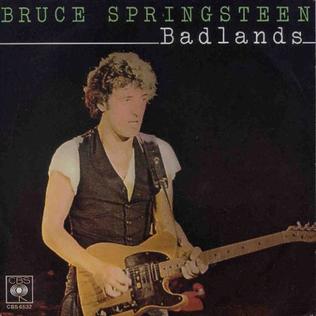
"Badlands" is a song by the American singer-songwriter Bruce Springsteen, released as the second single from his fourth studio album Darkness on the Edge of Town in July 1978.
"Bobby Jean" is a song written and performed by Bruce Springsteen, from his 1984 album Born in the U.S.A. Although not released as a single, it reached number 36 on the Billboard Mainstream Rock Tracks chart.
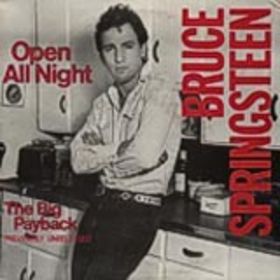
"Open All Night" is a song written and recorded by rock musician Bruce Springsteen, which first appeared on Springsteen's 1982 solo album Nebraska.

The Basics are an Australian band, formed by Wally De Backer and Kris Schroeder in 2002, later joined by Tim Heath. Their style has been described as anything from 'indie-pop' to 'rock'n'roll', though their records show they span a wide range of genres, including reggae, pop-rock, folk, country, and electro-pop.

Mal Blum is an American songwriter, musician, writer and performer from New York. Blum has released six full-length albums, most recently Pity Boy in 2019.
1313 Mockingbird Lane is an American garage rock band whose name was inspired by the fictional address of the Munster Mansion in the 1964–1966 television series The Munsters. The group formed in the late 1980s in Albany, New York, touring extensively, and releasing at least nine different 45 rpm records, LP records, and CD recordings. The band had a full-page narrative dedicated to them in Timothy Gassen's book The Knights of Fuzz, about the garage rock and psychedelic music phenomenon of 1980–1995. Of thousands of bands covered in the book, Gassen listed 1313 Mockingbird Lane on his "all time Hot 100" list, which also included The Chesterfield Kings and the Flamin' Groovies.
"Land of Hope and Dreams" is a 1999 song written by Bruce Springsteen and performed by Springsteen and the E Street Band. After being performed on tour and released on multiple live albums, a studio recording was released for the first time on Wrecking Ball in 2012.
